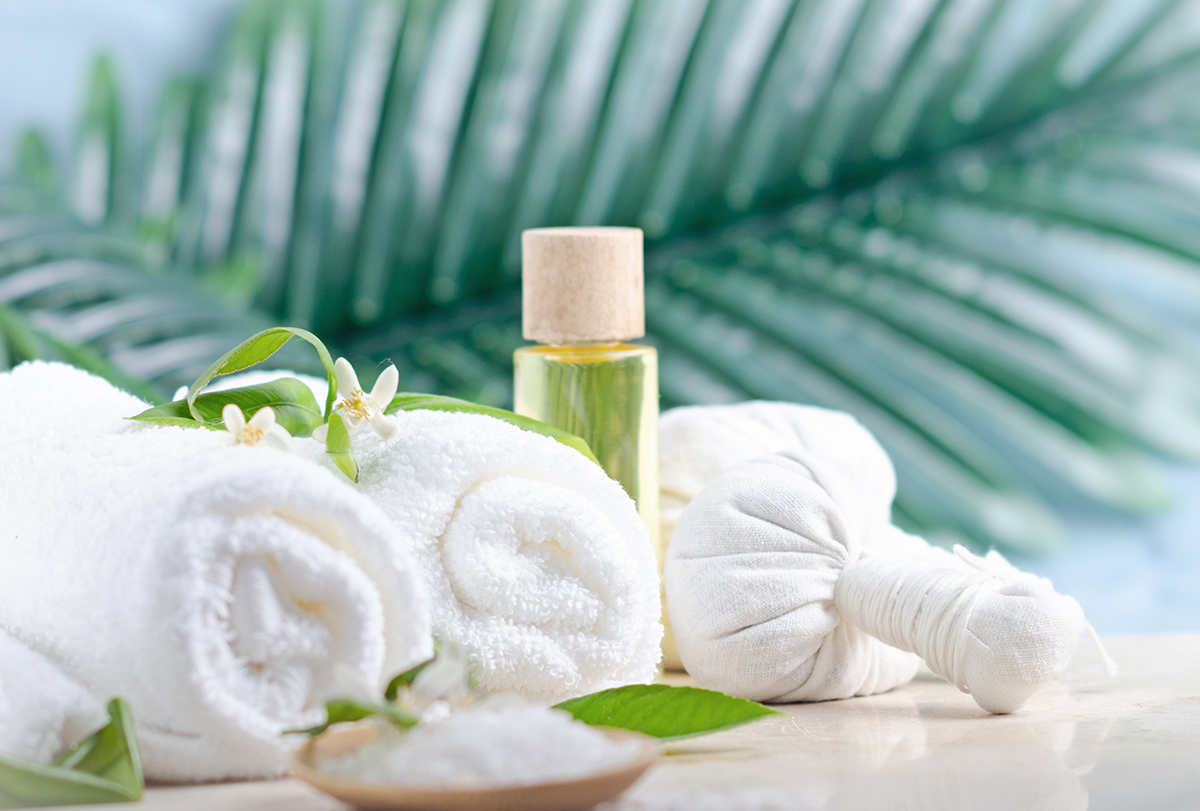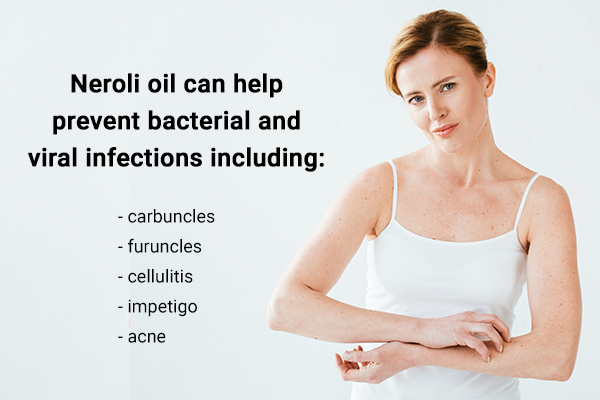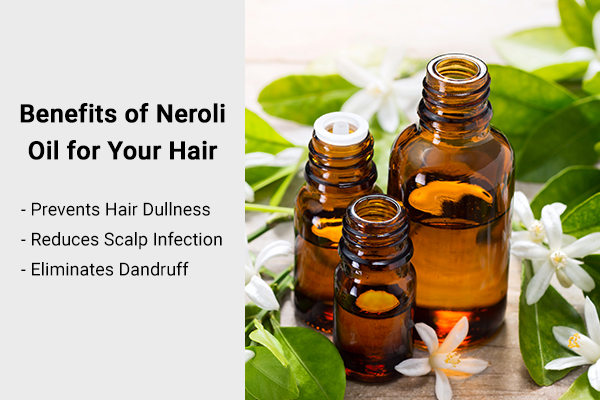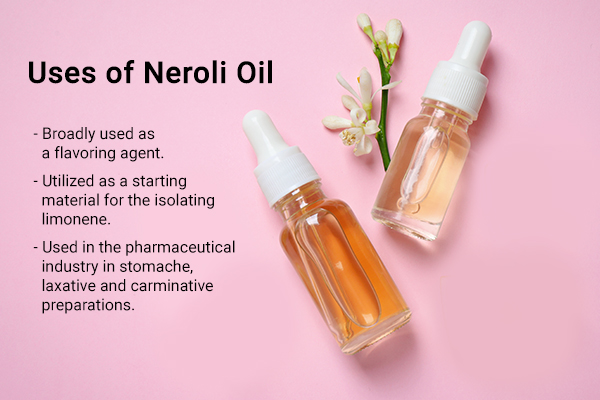In this article:
Essential oils are essential parts of skin and hair care. Many of these oils offer great benefits for your skin and hair.

Neroli oil or citrus oil is the essential oil extracted from bitter oranges, biologically called Citrus aurantium. It offers several benefits because of its bioactive molecules, (1) and it is widely used in traditional folk medicine throughout the world.
Citrus essential oils are popular ingredients in various industries including perfumeries because of their pleasant and refreshing smell and rich aroma.
The major compounds in bitter orange include:
- Monoterpenes
- Limonene
- Linalyl acetate
- Linalool
Benefits of Neroli Oil for the Skin
Neroli oil is nontoxic and therefore perfectly safe for use on your skin.
According to the 2016 Voluntary Cosmetic Registration Program (VCRP) data, Citrus aurantium amara (bitter orange) flower oil is a famous cosmetic ingredient and provides various benefits to the skin. It is mainly used in leave-on skin care preparations. It is also commonly and safely used in face powders at a maximum concentration of 0.01%. (2)
The benefits of neroli oil for the skin include the following:
1. Acts as an antifungal agent
Neroli oil is a promising affordable topical antifungal therapeutic agent.
Superficial dermatophyte infections are among the most common skin diseases, and some of these infections are exceptionally resistant to treatment.
A study where patients with these infections were treated daily with pure neroli oil or an emulsion of bitter orange oil showed that it has excellent fungistatic (a substance or treatment that inhibits the growth or reproduction of fungi) and fungicidal activity against a variety of pathogenic dermatophyte species. The use of the oil had no side effects except for mild irritation, which was seen with the use of the pure form. (3)
2. Prevents bacterial and viral skin infections

Common skin infections include:
- Carbuncles – Deep and painful skin infections that involve multiple hair follicles
- Furuncles or boils – Painful and inflamed skin infections in a single hair follicle caused by bacteria
- Cellulitis – A bacterial skin infection that affects the deeper layers of the skin and subcutaneous tissues
- Impetigo – A highly contagious bacterial skin infection that causes red sores that rupture and form yellowish-brown crusts
- Folliculitis
- Acne
Skin infections are some of the most commonly encountered infections. They commonly need topical treatment.
However, because of the ability of microbes to evolve after the overuse or incorrect use of the current traditional antimicrobials, there has been an emergence of resistance of these microbes to treatment. This has led to the growing use of alternative medicines by 60%–80% of developing countries, and essential oils are one of the natural products used for treating such infections.
One such essential oil that has the potential to fight off bacterial dermatological issues is neroli oil as it inhibits the growth of several bacteria. (4)(5)
3. Provides anti-inflammatory effects
Tissue inflammation can be the reason for skin issues such as atopic dermatitis. Bitter orange essential oil has shown anti-inflammatory activity, so neroli oil can be used to prevent inflammation and related skin disorders.
Neroli oil possesses properties that can reduce inflammation caused by acute and chronic conditions. It also has pain-relieving properties, which explain its traditional use for managing pain and inflammation. (6)
4. Prevents photoaging
The formation of free radicals is a widely acknowledged key mechanism that leads to skin aging. These free radicals can damage membranes, lipids, proteins, and DNA via oxidative stress.
Antioxidants are substances that can offer protection from endogenous and exogenous oxidative stresses by fighting free radicals.
Topical antioxidants such as neroli (Citrus aurantium L.) oil can therefore be used to prevent the clinical signs of photoaging. Studies have shown that bitter orange extract is rich in limonene and other components that have natural antioxidant properties. (7)(8)
ALSO READ: 16 Anti-Aging Oils for Glowing, Younger-Looking Skin
Benefits of Neroli Oil for the Hair

Using neroli oil on your hair can deliver the following benefits.
1. Prevents hair dullness
Compounds that show good antioxidant activity are understood to be tremendous for preventing hair loss since they help fight the oxidative stress created by free radicals. Oxidative stress is a major contributor to hair damage and subsequent loss. (9)
The antioxidant action of neroli oil can, thereby, help promote cell growth and liven up dull hair. It is also helpful in dealing with scalp ailments such as dermatitis and scalp irritation. (5)
2. Reduces scalp infection
Neroli oil has rich antimicrobial properties; thus, it can inhibit bacteria that negatively impact scalp health and causes scalp itching and redness. Furthermore, it alleviates the problem of dead skin cell buildup and excessive sebum production, which are bad for the scalp. (10)
3. Eliminates dandruff
The accumulation of dead skin and excess oil on the scalp is the leading cause of dandruff. Since neroli oil helps get rid of both dead skin cells and excess oil, it helps prevent dandruff. It also helps strengthen the roots and reduce hair fall.
A 2016 study showed that balancing the microbial populations (bacteria and fungi) on the scalp can help prevent dandruff. Since neroli oil exhibits both antimicrobial and antifungal actions, it can help maintain a clean scalp. It also controls flakiness, dryness, and itchiness of the scalp. (11)
Additional Uses of Neroli Oil for the Skin

Bitter orange oil can help improve: (4)
- Acne
- Aged and dry skin
- Broken capillaries
- Cuts
- Dermatitis
- Eczema
- Psoriasis
- Scars
- Stretch marks
- Thread veins
- Wounds
- Wrinkles
Most-Asked Questions About Neroli Oil for Skin and Hair
Is neroli oil safe to use?
Neroli oil is generally nonphototoxic, nontoxic, non-irritant, and nonsensitizing. Its limonene content, however, has been reported to cause contact dermatitis in some individuals. (12)
What are the other uses of neroli?
Neroli oil is also used as: (5)
- Fragrance in soaps, detergents, cosmetics, colognes, and perfumes
- A flavoring agent
- A starting material for isolating limonene
- An ingredient in the pharmaceutical industry in producing stomachic, laxative, and carminative preparations
Who can benefit from neroli oil aromatherapy?
People who suffer from the following conditions can benefit from neroli oil aromatherapy:
- Anxiety
- Depression
- Nervous tension
- Shock
- Stress-related conditions
Does neroli help in reducing stretch marks?
While neroli oil may have some benefits for the skin, no strong evidence suggests it can effectively reduce the appearance of stretch marks.
According to dermatologists, the best approach for preventing and managing stretch marks is to maintain a healthy lifestyle and use moisturizing products that support skin health.
Final Word
Neroli oil has not been studied considerably. However, many studies indicate that it has beneficial effects on the skin because of its antibacterial, antioxidative, and anti-inflammatory properties.
Always dilute essential oils in a carrier oil before applying them topically.
- Was this article helpful?
- YES, THANKS!NOT REALLY


